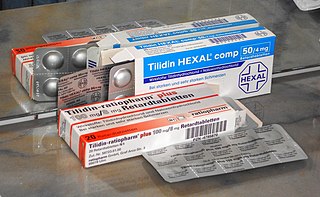Related Research Articles

The Food and Drug Administration is a federal agency of the United States Department of Health and Human Services, one of the United States federal executive departments. The FDA is responsible for protecting and promoting public health through the control and supervision of food safety, tobacco products, dietary supplements, prescription and over-the-counter pharmaceutical drugs (medications), vaccines, biopharmaceuticals, blood transfusions, medical devices, electromagnetic radiation emitting devices (ERED), cosmetics, animal foods & feed and veterinary products.

A medication is a drug used to diagnose, cure, treat, or prevent disease. Drug therapy (pharmacotherapy) is an important part of the medical field and relies on the science of pharmacology for continual advancement and on pharmacy for appropriate management.
The Australian Competition and Consumer Commission (ACCC) is an independent authority of the Australian Government. It was established in 1995 with the amalgamation of the Australian Trade Practices Commission (TPC) and the Prices Surveillance Authority to administer the Trade Practices Act 1974 (TPA) (Cth). Its mandate is to protect consumer rights, business rights and obligations, perform industry regulation and price monitoring and prevent illegal anti-competitive behaviour.

Good manufacturing practices (GMP) are the practices required in order to conform to the guidelines recommended by agencies that control the authorization and licensing of the manufacture and sale of food and beverages, cosmetics, pharmaceutical products, dietary supplements, and medical devices. These guidelines provide minimum requirements that a manufacturer must meet to assure that their products are consistently high in quality, from batch to batch, for their intended use. The rules that govern each industry may differ significantly; however, the main purpose of GMP is always to prevent harm from occurring to the end user. Additional tenets include ensuring the end product is free from contamination, that it is consistent in its manufacture, that its manufacture has been well documented, that personnel are well trained, and that the product has been checked for quality more than just at the end phase. GMP is typically ensured through the effective use of a quality management system (QMS).
The Pharmaceutical Benefits Scheme (PBS) is a program of the Australian Government that provides subsidised prescription drugs to residents of Australia, as well as certain foreign visitors covered by a Reciprocal Health Care Agreement. The PBS seeks to ensure that Australian residents have affordable and reliable access to a wide range of necessary medicines. The PBS has faced increased scrutiny as its cost has increased. The scheme assumes responsibility for the cost of drugs to patients in the community setting rather than while in hospital which is the responsibility of each state and territory. Together with Medicare the PBS is a key component of health care in Australia.

The regulation of therapeutic goods, defined as drugs and therapeutic devices, varies by jurisdiction. In some countries, such as the United States, they are regulated at the national level by a single agency. In other jurisdictions they are regulated at the state level, or at both state and national levels by various bodies, as in Australia.

A medical device is any device intended to be used for medical purposes. Thus what differentiates a medical device from an everyday device is its intended use. Medical devices benefit patients by helping health care providers diagnose and treat patients and helping patients overcome sickness or disease, improving their quality of life. Significant potential for hazards are inherent when using a device for medical purposes and thus medical devices must be proved safe and effective with reasonable assurance before regulating governments allow marketing of the device in their country. As a general rule, as the associated risk of the device increases the amount of testing required to establish safety and efficacy also increases. Further, as associated risk increases the potential benefit to the patient must also increase.

The Medicines and Healthcare products Regulatory Agency (MHRA) is an executive agency of the Department of Health and Social Care in the United Kingdom which is responsible for ensuring that medicines and medical devices work and are acceptably safe.
An adverse effect is an undesired harmful effect resulting from a medication or other intervention, such as surgery. An adverse effect may be termed a "side effect", when judged to be secondary to a main or therapeutic effect. If it results from an unsuitable or incorrect dosage or procedure, this is called a medical error and not a complication. Adverse effects are sometimes referred to as "iatrogenic" because they are generated by a physician/treatment. Some adverse effects occur only when starting, increasing or discontinuing a treatment.
Popper is a slang term given broadly to drugs of the chemical class called alkyl nitrites that are inhaled. Most widely sold products include the original isoamyl nitrite or isopentyl nitrite, and isopropyl nitrite. Isobutyl nitrite was also used until it was banned by the European Union. In some countries, to evade anti-drug laws, poppers are labelled or packaged as room deodorizers, leather polish, or tape head cleaner.
The Australian Drug Evaluation Committee or ADEC, was a committee that provided independent scientific advice to the Australian Government regarding therapeutic drugs. The committee was originally formed in 1963 and more recently authorised under the Therapeutic Goods Act 1989 (Cth) as part of the Therapeutic Goods Administration (TGA). In 2010, ADEC was replaced by the Advisory Committee on Prescription Medicines (ACPM)

The Therapeutic Goods Administration (TGA) is the regulatory body for therapeutic goods in Australia. It is a Division of the Australian Department of Health established under the Therapeutic Goods Act 1989 (Cth). The TGA is responsible for conducting assessment and monitoring activities to ensure that therapeutic goods available in Australia are of an acceptable standard and that access to therapeutic advances is in a timely manner.
A food safety agency or food administration is a kind of agency found in various countries and international organizations with responsibilities related to food, primarily with ensuring the safety of food sold or distributed to the population, and with ensuring that food sellers inform the population of the origins and health qualities and risks associated with food being sold.
A patient safety organization (PSO) is a group, institution, or association that improves medical care by reducing medical errors. Common functions of patient safety organizations are data collection and analysis, reporting, education, funding, and advocacy.

The Health Sciences Authority is a statutory board under the Ministry of Health of the Singapore Government, next to Outram Park MRT station.

Food safety in China is a growing concern relating to agriculture. China's principal crops are rice, corn, wheat, soybeans, and cotton in addition to apples and other fruits and vegetables. China's principal livestock products include pork, beef, dairy, and eggs. The Chinese government oversees agricultural production as well as the manufacture of food packaging, containers, chemical additives, drug production, and business regulation. In recent years, the Chinese government attempted to consolidate food safety regulation with the creation of the State Food and Drug Administration of China in 2003; officials have also been under increasing public and international pressure to solve food safety problems. Chinese Vice Premier Li Keqiang said, "Food is essential, and safety should be a top priority. Food safety is closely related to people's lives and health and economic development and social harmony," at a State Council meeting in Beijing.
Medsafe, the New Zealand Medicines and Medical Devices Safety Authority, is the medical regulatory body run by the New Zealand Ministry of Health, administering the Medicines Act 1981 and Medicines Regulations 1984.
Because of the uncertain nature of various alternative therapies and the wide variety of claims different practitioners make, alternative medicine has been a source of vigorous debate, even over the definition of "alternative medicine". Dietary supplements, their ingredients, safety, and claims, are a continual source of controversy. In some cases, political issues, mainstream medicine and alternative medicine all collide, such as in cases where synthetic drugs are legal but the herbal sources of the same active chemical are banned.
Regulation of electronic cigarettes varies across countries and states, ranging from no regulation to banning them entirely. For instance, e-cigarettes were illegal in Japan, which forced the market to use heat-not-burn tobacco products for cigarette alternatives. Others have introduced strict restrictions and some have licensed devices as medicines such as in the UK. However, as of February 2018, there is no e-cigarette device that has been given a medical license that is commercially sold or available by prescription in the UK. As of 2015, around two thirds of major nations have regulated e-cigarettes in some way. Because of the potential relationship with tobacco laws and medical drug policies, e-cigarette legislation is being debated in many countries. The companies that make e-cigarettes have been pushing for laws that support their interests. In 2016 the US Department of Transportation banned the use of e-cigarettes on commercial flights. This regulation applies to all flights to and from the US. In 2018, the Royal College of Physicians asked that a balance is found in regulations over e-cigarettes that ensure product safety while encouraging smokers to use them instead of tobacco, as well as keep an eye on any effects contrary to the control agencies for tobacco. A recent study shows electronic device company "JUUL" contains carcinogens and other harmful ingredients inside their e-juice cartridges.
The International Coalition of Medicines Regulatory Authorities is a global conference of government health bureaucrats.
References
- ↑ "About the TGA". Department of Health Therapeutic Goods Administration.
- ↑ Ministry of Health. "Medsafe - Homepage". New Zealand Medicines and Medical Devices Safety Authority. Archived from the original on 24 October 2011. Retrieved 27 October 2011.
- 1 2 "Oceania Regulator ANZTPA Shut Down by Australia and New Zealand - RAPS" . Retrieved 1 December 2016.